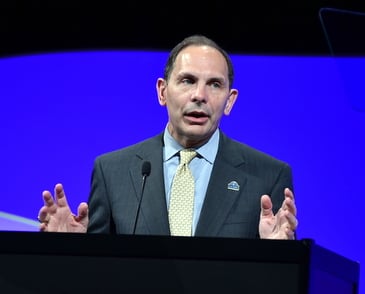The U.S. Department of Veterans Affairs (VA) is working to right wrongs, reframe perceptions and enhance care for veterans—and it needs the help of physicians, VA Secretary Robert A. McDonald (pictured below) told the AMA House of Delegates Saturday at the 2014 AMA Interim Meeting in Dallas.
Citing recent access-to-care issues for veterans, McDonald told physicians about the VA’s “Blueprint for Excellence,” which seeks to:
- Improve performance of the VA health care system
- Reset the VA’s culture to place value on job performance
- Transition from “sick care” to “health care”
- Develop efficient, transparent processes to support the VA’s span of care, services and programs
McDonald pointed to the AMA’s Improving Health Outcomes initiative as a good example of the work the VA needs to undertake to manage its massive patient base—there were more than 90 million scheduled appointments in 2013.
“Right now, one of the biggest challenges we face is the shortage of clinicians,” McDonald said. “The demand for VA care will not decrease any time soon. The nation’s been at war for over a decade, and we’ll continue to be caring for many of our severely wounded and ill veterans for decades to come.”
To mitigate this, he’s visiting U.S. medical schools to recruit students to work for the VA. He discussed the Veterans Access, Choice and Accountability Act—a law the AMA helped shape—which will give authorities funding and other tools to better serve veterans in the short term.
This week, more than 30,000 vets who live more than 40 miles from a VA medical facility received their Choice Cards, which allows them to secure care in the private sector. By the end of the month, another 370,000 vets who face waits longer than 30 days for VA care also will receive the cards.
“We need to configure the Choice program in a way that enables all doctors caring for veterans to work as teams, no matter who is paying the bill,” McDonald said. “We need you to participate in the program, and we know you won’t if it’s too much trouble.”
McDonald asked the physicians at the meeting, and those watching the live stream of his address, to give their input and advice on the VA’s Choice Act and its future plans.
“VA cannot accomplish its mission as a stand-alone system,” he said. “We’re part of a larger community facing the same challenges you face.”




